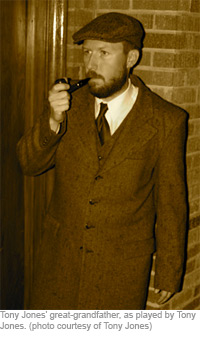Doug Pagitt

Doug Pagitt and Tony Jones have been at this whole church leadership thing for a while now. As two of the voices at the forefront of the emerging Christianity movement, they are visionaries, strategists, and hands-on practitioners who, as much or more than anyone, have wrestled with the complex and persistent question of what tomorrow’s Christian faith looks like.
For one thing, there’s an emphasis on the word movement: ideas, communities, and understanding of what it means to be engaging a Christ-inspired faith in relevant ways is forever in flux. As such, certain contemporary iterations of the Christian tribe have been criticized for being ill defined or for too easily accommodating cultural trends.
But if Christianity is being true to the one from whom its name is borrowed, it will undoubtedly be countercultural. Any practice that has at it’s core mantras like “it’s not all about you,” or “community need trumps personal gain” will find a skeptical audience in popular culture. Jones and Pagitt are far less interested in offering church leaders a novel attraction gimmick to fill their struggling churches. Rather, they are focused on helping visionaries, activists, and theologians discern what it means to be a follower of Jesus in the 21st century.
That’s why they created the Christianity 21 Conference, part of what Pagitt describes as the Generous Christianity Movement.

I can’t count how many times I’ve heard people within mainline Christian churches note that, though they don’t embrace all of the theological positions of their evangelical sisters and brothers, they are impressed by their aptitude for organizing and affecting change on a large scale. At the same time, I see thousands converge at festivals like the Wild Goose festival in North Carolina, feeling both fed by the invigorating sense of community, but also frustrated to be leaving with the still unanswered question:
What do we do now?
The CANA Initiative, which is a joint collaboration of Brian McLaren, Stephanie Spellers, and Doug Pagitt, seeks to help answer that nagging question. Cana seeks to be the connective tissue that helps hold together communities of faith that share common priorities in addressing the pressing socioeconomic issues of our time.
From their website, “The CANA Initiative brings together innovative leaders from all streams of the faith to collaborate in the development of new ways of being Christian ... new ways of doing theology and living biblically, new understandings and practices of mission, new kinds of faith communities, new approaches to worship and spiritual formation, new integrations and conversations and convergences and dreams.”
Following is an audio interview I conducted with these three key voices in the CANA conversation. We talked about why CANA is needed now, more than ever, and what sort of transformation they hope to affect within the greater Christian body.
 This summer, two friends and I are doing something that seems a bit outlandish (especially for 40-year-old guys). We've borrowed a friend's RV, and we're touring the country to talk about our books. Doug Pagitt (A Christianity Worth Believing), Mark Scandrette (
This summer, two friends and I are doing something that seems a bit outlandish (especially for 40-year-old guys). We've borrowed a friend's RV, and we're touring the country to talk about our books. Doug Pagitt (A Christianity Worth Believing), Mark Scandrette (